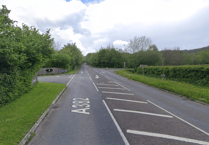AS part of our Bradley Bug Recovery Project, Green Futures volunteers wanted to find out more about our local moths, writes Andrew Rothery.
With generous financial support from local Bradley Councillor Richard Buscombe, the kind donation of a recycled battery from Teign Battery Centre and technical help from Phil Sansum of Devon Biodiversity Records Centre, we have been able to set up a moth collector at various locations around Bradley ward to sample our local moth populations.
Green Futures chairperson Samantha Hibbert said: ‘Moth collecting at night is such a rewarding experience. There are so many different species with really intricate patterns and beautiful colours. To think that they’re out at night when we’re all asleep, pollinating our flowers and crops, is very inspiring.’
Recent research from the University of Sheffield suggests that moths are just as efficient pollinators as bees and other day-flying insects, which means that they are a crucial part of the ecological framework supports our flowering plants and crops.
Unfortunately, as with daytime pollinators, moth populations across the UK have been in decline since the late 1960’s due to loss of habitat, increased levels of light pollution and the use of pesticides.
There are around 2500 species of moth in the UK, but for most of us the only time we think about them is when they appear in the car headlights or when we find holes in our best jumper in the wardrobe.
Figures from the UK Butterfly Conservation charity show that the decline in moth species over the last 50 years has been greater in southern Britain, with a decline of 39% since 1968. There have been dramatic declines in a number of species including the Garden Tiger - down 90%, the pink striped Blood Vein – down 59% and the White Ermine - down 71%. 20 species of moth have now been officially declared extinct since the start of the 20th Century.
‘These figures are greatly alarming for all of us,’ said Clr Buscombe. ‘We all know about the declines in bees and butterflies, but to find out that moths are so important for pollination and that they too are in decline is a wake-up call for all of us.
‘That is why I want to support local people like the Green Futures volunteers to engage more directly with their local environment. We need to understand what’s going on in our own back gardens and countryside, so that we can restore the damage we’ve all caused.’
With the support of the Devon Biodiversity Records Centre and the Devon Environment Foundation, Green Futures are now building a local database for moth species across Bradley Ward. Phil Sansum from DBRC said “Collecting data is so important for biodiversity restoration.
If we can learn what species we have locally and how abundant they are, we can take the practical steps that are needed for restoring habitat”. If you would like to get involved in the Bradley Bug Recovery project, so email Green Futures at [email protected]





Comments
This article has no comments yet. Be the first to leave a comment.